
Climbing coach Tom Powell shares some tips for dealing with social fears at the wall or at the crag...
*This is a long-read - please consider reading on a desktop device!*
"And indeed there will be time to prepare a face to meet the faces that you meet." T.S. Eliot, The Lovesong of J Alfred Prufrock
Climbing and Social Pressure
There is no denying that climbing is a voyeuristic sport. Crags, boulders and indoor walls all serve as a stage and us climbers can become the victims of putting on a performance.
I would be very surprised to meet a climber who hasn't let social pressures affect their climbing in a negative way. As a coach who works with anxiety, a climbing coach and also a person who works and plays on climbing walls and crags as much as possible, I think that the undue pressure we place on ourselves whilst we are climbing is the biggest underlying factor that limits our progression and fractures our enjoyment.
Whilst it is common for us to feel social pressure the most when there is a crowd gathered around us, we can still suffer from the feeling of social pressure when there isn't even a single person around to witness our own actions. An example of this is the feeling of dread when your friends ask you how your day at the crag went, or when you dutifully log your climbs on UKC for all the world to see.
In this article I aim to share some thoughts and theories behind the frustrating feelings of social pressure, as well as offer some suggestions for how to combat them. I don't believe that a single piece of information is more important than another and there are all sorts of alternative theories and solutions on offer beyond what I mention in this article. I want to provide a 'pick n mix' of some theories you may not have explored before and I hope that something useful for you comes from reading it. As this article can only skim the surface of a broad variety of topics, I have had to keep it (relatively) short and hopefully not overly academic. As such I haven't gone down the road of showing all the analysis and sources, I have however provided a 'further study' list at the bottom of the article for those who are inspired to seek out new information.
I present all of this in the knowledge that we can make significant changes to who we think we are and how we experience the world. Carol Dweck's work and subsequent book 'Mindset: How You Can Fulfil Your Potential' argues that whether or not you will experience a change in your life comes down to whether or not you believe you are in charge of it. In other words if you imagine you are a bus, then who is sitting in the driver's seat? If you don't believe it is you, then hold on tight, because you are in for a bumpy ride.
The Goal
I believe that in climbing we should aim towards having an 'optimal mindset.' This means that we have sufficient control of our thoughts and actions so that we are confident that we can aim for what we want (what we get is not always within our control, as I discuss later). When a well-trained actor is about to step onto the stage, they know they have prepared for the role and they know they have learned their lines and their prompts. They will be aware that each member of the crowd will be ready to form an opinion of the performance, and yet before they walk onto the stage they have to let all of that go. The only thing the actor can control is to play their role in that moment. Unwanted thoughts of anxiety, frustration and anger can cloud our vision and erode our confidence and certainty and lead us away from our target. We must seek to understand where these thoughts come from and find useful tools to condition ourselves so that we can function optimally at all times. This mindset is also referred to by some people as "mental toughness" or "grit" and I will talk more on this subject in future articles.

Chapter 1: Mental Sabotage
Mental sabotage is mis-using our thoughts and our focus to create our own misery. Psychologists have uncovered various cognitive biases and pitfalls that we unknowingly create that disrupt our focus and limit our enjoyment. Here are two that are particularly relevant to social pressure and climbing.
The Spotlight Effect
I was hyper aware of my acne as a teenager, and I lived in fear because I believed everyone saw only my spots and not the face beneath them. I wish I had the ability to go back in time and let him know that almost every other teenager in my school was so focused on their own body changes that they had little or no time to notice or care about the spots on my face. I would also have pointed out that what they would notice however, was the way I slumped my shoulders, averted my gaze and put my hands to my face to protect myself and make myself look smaller and less visible. I was suffering from what would be coined in 1999 as "The Spotlight Effect."
The fact that we have to live in our own minds, and are the centre of our own world, means that it is often common to over-assume the amount of time and energy others spend thinking about us. Whilst it is true that they may be watching or discussing us in that moment, it is unlikely that they will continue thinking about us after the moment has passed. In fact when they have finished it is much more likely their thoughts will drift back to their own 'centre of the world.'
Believing there is a spotlight on us will more than likely bring our focus inwards and into self analysis, as well as outwards onto the mind reads (more on them later) of our perceived audience. Both of these reactions will rob us of our focus on the task at hand. When we are climbing it is further amplified because there will be times when people do watch us, and they may even gain great pleasure in watching us struggling on a route. However, due to the self-involved nature of humans, whilst our struggles may be the trigger for somebody else's sense of satisfaction it is a 'self-satisfaction.' That is to say, that they are formulating judgements about themselves and not of us.
The good, the young and the unusual
Sometimes the spotlight effect is much, much stronger. If I received a pound every time I hear someone make a remark when a young climber gets on the wall, I could be close to retirement by now. It certainly is more common for people to watch if you are in some way 'remarkable.' It can be challenging when people audibly let out disparaging and ill-formed remarks; "She's so good because she's young and has no fear," or "They're so good because of their power to weight ratio," or "He's so good because he's so tall" and so on. Sponsored climbers, climbing instructors, local heroes, old people, young people, heavy people, small people, tall people, people with disabilities, all at times, will attract a real audience because they are in someway more noticeable than the normal crowd. The spectators are real, their remarks are audible (and often incorrect), the spotlight however is our internal creation.
Mind Reads
If I am standing in a lift filled with 10 people and I let out an audible and prolonged fart it would be socially normal for me to feel ashamed of myself because it is in our culture in the UK to be shamed for our bodily emissions (unlike in a group of hippos where I could spray my poo with my tail to impress female hippos). I could then add extra pressure on myself by thinking that all of the people in the lift with me would consider me less charismatic and the next time they meet me they would overlook my more positive qualities and remember me as the person who farts in lifts. I may be reasonably accurate with my mind read, but here's the thing: you don't know until you ask, and even if you do ask, you would have to be persistent and concise about your questions to gain genuine and accurate answers, and it isn't 'socially normal' to fart in a lift and then ask people questions about it.
It is common not only to truly believe we can read minds, but much worse, to only offer ourselves a small selection of limiting possibilities when we do so. It could be possible that out of the ten other people in the lift only one person considered my audible fart a shameful act and put a mental note to not speak to me (good riddance to that person). Three people were so self involved in their own public insecurities that they didn't even notice. One person was so stressed about work it barely broke their attention. One person was secretly envious, because they always have stomach cramps and wish they had the power to self-medicate with a good fart. One person thought the situation was hilarious, another person was deeply relieved as they let out their own bottom ripple just after mine began, and the other two were on their way to a seminar for people who can't hear or smell.
Tricks to escape Mental Sabotage and focus on what you want
It's time to take control of our focus, and to prove to ourselves that we are in control of our imagination. Our imagination is like a muscle and it needs constant conditioning if it is going to perform for us. If we don't consistently provide our imagination with clear boundaries and discipline, then it will fail to perform in the way that we want it to when under duress. It needs to have opportunities to prepare and rehearse so that it can perform at its absolute best. We do this through deliberate visualisation. When we deliberately visualise we make the rules and decide how we play the game so that we can enter into any arena feeling fully prepared. For those of you who have spent some time climbing, you know you would never get on your dream onsight or redpoint without having thoroughly read the route and rehearsed the moves, otherwise you would be setting yourself up for uncertainty and sabotaging your chances of success. Then why enter into a stressful social situation without having put in the mental preparation so that you can operate at your very best?
There are all sorts of mental tricks that we can use to prepare ourselves for situations that challenge us, here is a process for one of them.
Make a dedicated time where you have zero interruptions and can have at least 10 minutes to yourself. Establish a routine where you can do this once or twice a day, for as long as it takes.
Imagine experiencing and exploring a version of yourself on the inside and outside that is capable, resilient, confident, focused (you can pick and choose the most important qualities). What does that version of yourself look like and how do you know that you embody these qualities? Is it something about the way you hold yourself and the way you stand? Is it the the quality and tone of your voice? Is it a feeling you have inside? And if so, what does that feeling look like and does it need to spread and get bigger and brighter to maximise your positive qualities? Get so specific on the details that you would be able to describe and demonstrate them to a friend.
Go to a future scenario that would be challenging for you. How does this best version of yourself think, feel and act in a way that is capable of this challenge? What are their unique qualities that means you can withstand whatever comes your way and come out the other side a bigger and better person?
Once you have visualised all the way through the challenge (you can fast forward through it if it is too difficult to see it through) and it is over and you are safely on the other side and everything is fine again, what lessons can you share with the version of you that is in the past and preparing themselves for the challenge?
You know you are winning at this when instead of having feelings such as sweaty palms, a tight stomach and rapid breathing, you have instead all those powerful feelings that the best version of yourself carries with them. Once you have rehearsed enough, you are ready to test it on the real thing. It is always best to start on a small challenge and work your way up.
Chapter 2: Evolution Theories
Whilst us humans consider ourselves to be highly evolved and we are capable of logical reasoning and advanced problem solving, we still find ourselves at the mercy of the remnants of our survival instincts left within us from our earliest ancestors and this can at times be overwhelming and inappropriate in certain contexts. Evolutionary theory can go some way towards explaining some of the more common and pervasive fears that we can all experience when we turn up at the wall or crag.
Threatening eyes
Early humans lived in a world where the possibility of a sudden lethal attack was much more likely than today. A stroll away from home meant the possibility of being hunted by wild animals or by rival groups. Our ability to quickly detect faces and eyes has been studied extensively and it is well documented that we react to the presence of a face before we are even consciously aware of processing it. Our primal reactions of fight, flight or freeze can kick in if we perceive eyes that are seen as threatening so that we could prepare ourselves for the ambush coming from the undergrowth. This theory is often referenced in respect to the fear of public speaking and it's no wonder that people use the phrase "I was eaten alive out there" when they have had a tough reaction from the crowd. In climbing we can get the same feeling when we are aware, or we imagine, that many pairs of eyes are locked onto us.
Social Isolation
Another evolutionary theory is that it is in our survival instincts to gain social status. This is because the more social power one could hold the easier it would be for them to secure breeding partners. Our desire to impress those important to us or to maintain our perception of status, is hardwired into us. On the other end of the scale, if one didn't conform to social norms then they could be excluded from the group and left to fend for themselves. This would most likely lead to a lack of children and an early death, which would strengthen the gene pool in favour of those who work hard to remain with the group. Despite how much our society has changed, and how we now value being 'individuals,' many of us still find it very difficult to break free from our desire to fit in. The feeling of loneliness is still recognised by the brain in the same way as physical pain and therefore is something to avoid. We can experience our anxiety, or anticipation of this 'pain', when we allow our self worth to be assigned to us by strangers or careless people and when we are about to perform a skill or task such as getting on a certain route or boulder problem.
Ways to fight our instincts when climbing
Many of our evolutionary traits are no longer applicable to modern day living, after all, the very sake of climbing is challenging our natural desire to avoid falling off from great heights. It is possible to prove to the part of you that wants safety that you won't be attacked when you are being watched and you won't be ostracised if you struggle. Prove your evolutionary theory wrong often enough and you can begin to learn that you are safe, and your threats are merely the shadows of your ancestors. Understand and minimise the control your instincts have on your climbing and well-being. Be aware that we all have a level of instinctual drift that means that without constant conditioning we will slowly return to our instinctual nature. When we feel in danger, we focus on thoughts of self preservation, that is to say, that we will retreat, defend or attack; however, when we feel safe, we have the ability to focus on goals that are beyond our basic survival needs, such as leisure and contribution. Prove to yourself that you are safe when your nervous system is thinking otherwise, and you can be more resourceful more frequently.
In climbing we often logically know that the crowd watching us won't really eat us alive, and they will probably either say nothing at all, or in fact be polite and complimentary. However, there are times where we have to show our primal side real evidence of this.
Taking part in a local climbing competition is a good way of stepping into an environment with a crowd and perhaps judges, where your performance will be judged and assigned a number and a ranking. The end result, however, certainly won't be that you will receive 'disapproval' or be 'thrown out of the climbing wall' or even 'ridiculed' in fact the chances are that you will be applauded, supported and admired for your efforts and bravery.
If this seems too big a step then notice where certain hot-spots develop at a crag or climbing wall. This is when an enthusiastic group of climbers are focusing their attention on a certain location. They may all be working a specific route or problem or a variety of different ones. If the group is high energy and supportive towards each other, then be patient and wait your turn, but make a point of climbing in the same general area as they do, and if you want to take an extra step have a go at starting some simple dialogue with the friendliest climber. No matter how good or how much better they are than you at climbing, most friendly climbers love to support and include others in their journey.
Chapter 3: Psychological Theories
Each of us have grown up to live a truly unique life with experiences that are entirely individualised to us. As a consequence of this, we all carry our own unique way of making sense of ourselves and our world, and our unconscious mind weaves a story for us that often sits just below our conscious recognition. It is through understanding how and why our unconscious holds onto these ways of being that we can begin to take further authorship over our lives. In our climbing lives this means that the 'good' and 'bad' days no longer happen by chance, or are dictated by the people at the wall or crag, they are a circumstance of how we are choosing to interpret our situation.
"Until you make the unconscious conscious it will direct your life and you will call it fate." - Carl Jung
Significant Emotional Events
Sociologist Morris Massey made famous the concept of Significant Emotional Events (SEEs). These are the stand-out moments in your life that, for better or for worse, can seem like a fixed part of the narrative of who we are. If we were a tree trunk showing our rings, then a SEE would be a visible mark in the timeline of our life with its own story to tell. An example of a SEE would be a memory of a time your climbing partner dropped you, or a childhood memory of witnessing an accident. SEEs can present themselves in how we think and act in the present day and negative SEEs can be linked with phobias, traumas, limiting beliefs and habits. Of course each SEE is unique to each and every individual, and most importantly they can be changed. Many climbers bring a baggage of memories and emotions to the climbing wall with them. Finding ways to leave the baggage someplace else is essential if you want to focus only on what you want.
Impostor Experience
A fallout from both mind reads and SEEs is what has been called The Impostor Syndrome. This is the feeling that one day your society, school, climbing community, the universe etc will discover that actually you are a fraud and that all your successes have just been wild strokes of luck and all your failures highlight your default level of incompetence. One day you will be found out and your successes will be taken away from you. The Impostor Syndrome is something that most people have experienced at some point in their life in one form or another, and for some people it can begin to take over their everyday experiences.
The secret to the power of the Impostor Syndrome is that it feels unique to you, and voicing your experience feels as if you will be exposing yourself as fraudulent. What makes impostorism doubly worse is that with every success comes the feeling that you are just increasing the height from which you will fall. Our language and culture of worship can add fuel to the fire when it comes to feeling fraudulent, as there is a tendency to elevate people by referring to ourselves as "mere mortals" and them as "machines", "incredible", "Gods". We climb to challenge ourselves in the face of uncertainty, and if every time we leave the ground with thoughts of "this time they will realise that I'm just a fraud" our attention is being sorely misdirected away from our desired goals. Imposterism is more widespread than you think and can affect anyone from any walk of life or level of experience and if you have experienced it, I assure you that you are not alone.
How to overcome Imposterism and SEEs
For phobias, trauma and negative feedback loops such as imposterism that are triggered due to a Significant Emotional Event that you can't seem to shake by yourself, it is best to seek professional help so that you can learn how to leave them behind in order to move forwards.
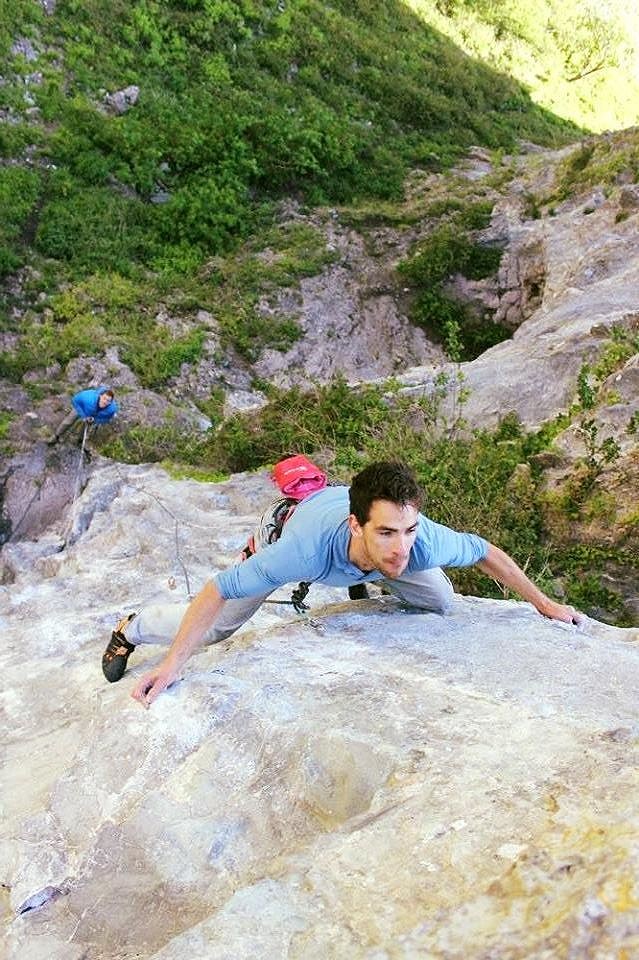
Unconscious Filters
According to psychologist Carl Jung, every person has their own unconscious filters for how they experience the world. This was expanded upon and made more famous by two of his students who built on his initial work to create the Myers Briggs test. My specialty, Neuro-Linguistic Programming (NLP), also has its own variant on this called Meta Programmes. Whilst it is possible for these filters to change either rapidly or more slowly in an individual's lifetime, especially after a Significant Emotional Event, we tend to quite often stick within these programmes. Many of these unconscious filters determine how we experience and interpret our climbing.
One of the most relevant filters for this article is our level of extroversion and introversion. An extrovert will go to the climbing wall and recharge their batteries by being in and amongst people; you might find them in the middle of a crowd unaware of the hustle and bustle that is going on around them and when they finish their evening they may come home feeling energised. An introvert will go to the climbing wall and look for climbs away from the crowd, when they are in a busy environment they may try to keep to the outside edges so that they can keep their eye on the crowds. When they are in amongst the crowd it may be draining and over stimulating and movement and noise could be very distracting. The introvert may come home feeling drained.
I find that in most contexts of life I currently sit on the introvert side of the scale. As someone who has worked in a variety of indoor and outdoor climbing and activity centres, I have spent a lot of time working in busy environments and have learned to take control of my energy levels by recognising what type of environments would drain me and to recognise symptoms for when my ability to stay focused begins to become strained. I would then seek to find a way to manage my situation. Sometimes this is something I can do whilst remaining in the environment, at other times it's by giving myself five minutes away from others to charge my batteries back to normal. The 7 techniques listed at the bottom of this article are useful ways for regaining control of your well-being in these scenarios.
Values and Beliefs
Our values and beliefs are some of the most important and most unconscious drivers that make us who we are, and they determine the way we believe the world to be. When we come into conflict with ourselves or other people it is because our values and beliefs about the way things 'are' or 'should be' conflict with what we are experiencing.
Ask yourself: Why do I climb? If it is for isolation, self expression or freedom, then seeking out opportunities to thrive in a competition environment may be in conflict with your highest set of values. If it is for friendship or achievement, then you must think carefully about the environment and the people you are choosing to be with, as well as the strategies you are using to attain these values. If it is to impress others then you will naturally encounter a lot of hardship and stress because you are placing your well-being outside of your own body and into areas you can't control (more on that later). Whatever your values are, your environment and how you act within it will determine whether you reach your goals or achieve a sense of satisfaction and harmony. Certain values will bring you closer to environments with social pressures than others.
Write down a list of at least your top 10 values; one set for 'climbing' and another set of 10 for 'life'. Then arrange them in order and ask yourself these questions:
Are the values in harmony with each other?
How do they relate to your current climbing plans?
How do they correspond with your best/worst day of climbing?
What have I learned from this?
How to make sense of your psychology
Recognising your meta programmes and beliefs and values can help you to understand why you do what you do. It is through understanding yourself more clearly that you can steer yourself towards more effective strategies for getting what you want, and away from all the strategies that drain you of energy and your ability to thrive.
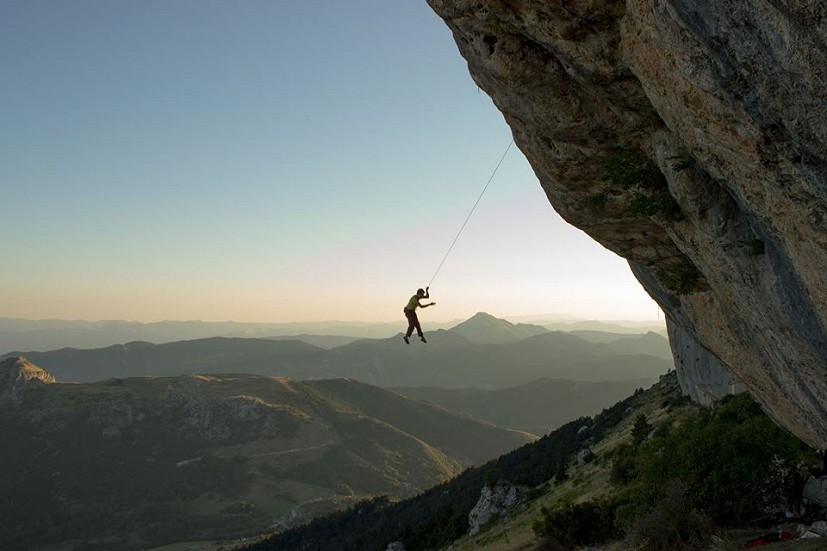
Chapter 4: Philosophy
A good philosophy contains guidelines and blueprints that allow us to have meaning in our life. If we haven't thought consciously about what our philosophy is, then the chances are we have had a philosophy chosen for us by the most influential parts of our environment, this might be our caregivers, religion, peer group or TV. When we feel dissatisfied, frustrated or inauthentic then the chances are that we are operating within a philosophy that doesn't match our own values and beliefs. We are often told that philosophies must be fixed, and we must subscribe to "The One" and "True" way of being, whether this is the rules of your parents, a self help book, a religion or how you eat i.e. veganism or carnivorism, and this leads us back to the roots of our instinctual bias to fit into a group for fear of being ostracised.
Taking charge of our own climbing philosophy can have a massive impact on whether we are being congruent with our values, beliefs and behaviours, and it takes the control out of the hands of others and puts it firmly into our own hands. If we want to have a sense of control and direction in our lives then we have to make sure that it is us who is sitting in the driver's seat.
Your Climbing Philosophy
Write down 5-10 points philosophical points that you would like to remember and adhere to when you climb. This is your blueprint for who you would like to be when you climb. The most important thing is to keep it flexible; your climbing philosophy should be a compelling reminder of why you do what you do, and keep you aiming for your target. Here are a few good examples.
I climb for fitness and to express myself through movement
I use tactics to ensure I am in the right headspace before I leave the ground
Falling = Learning. I aim to learn all the time
Once you have written down your philosophy, place it somewhere where you will see it often, and I would suggest that at least one other climbing friend can see it so they can hold you accountable if you are causing yourself pain by straying from your philosophy.
Stoicism and thoughts on control
According to Stoic philosophy (and most modern psychological practices) the only two things we are ever in control of are our thoughts and our actions. We are not in control of the thoughts and actions of others and therefore we should let go of our desire to try and assume control over them and instead place our focus on knowing what we can control. If we have taken time to construct an optimal mindset, then when we are about to begin a route, we can take control over more things than might at first seem possible, especially when our mind isn't distracted by all the things outside of our control.
We can be in control of our physiology, that is, how we regulate our breathing, our heart rate, our speed of movement, the relaxation we put into our muscles and how we hold ourselves to affect a posture of confidence or strength. We are in control of what we want to focus on and where we would like to direct our attention. We can create a mental target to aim for and our mental discipline will be the factor for how straight and true our arrow will fly. We have control over what we say to our belayer and how we treat them in that moment. We have NO control over how well our belayer actually belays us, or where they are directing their attention; we have no control over the thoughts or actions of the crowd watching us, we have no control over their opinions or judgements and we have no control over any other external factors that we cannot reach or touch in that given moment.
A simple stoic practice in the climbing wall
Pick one or two simple things within your realm of control that you want to focus on. Perhaps this is something as obvious as your vision. Try climbing some easy routes and being fully conscious of keeping your vision not only on your climb but on the climbs either side of you, this is a literal take on choosing what you wish to focus on and reminding yourself that you are in charge of where you want to look. Another alternative is to focus on your hands because you can remind yourself that you are in control of the pressure you exert on the holds. Before you begin your climb bring your attention to your fingers by giving them a wiggle to soften them, and place them on the starting holds as gently as you can. Try some easy routes and place your attention into how, with conscious effort, you have control over how lightly or how tightly you can hold on. Too light and you might fall, too tight and you will pump yourself out.
Pick one or two things that are outside your realm of control, such as the people who are watching you, or the comments from your belayer. When thoughts, visions or sounds of them come to your awareness, notice that these are not things that you have power over. As silly as it sounds tell yourself "It will be fine," because it has to be since it is something outside of your immediate control, and then bring your attention back to your realm of control.
7 Disciplines to Building an Optimal Mindset
Beyond what I have already covered, if I could provide an essential kit of techniques for managing social pressure in the climbing environment, then the following would be included.
When my clients have taken these disciplines and turned them into habitual daily practices, the results that they have achieved are always remarkable. I have witnessed a client being able to thrive in situations that used to bring on anxiety attacks and leave them running for an exit, and in a single session I have watched a client relax enough to make their project become a piece of cake. However I cannot emphasise enough that these disciplines need to be worked on a little bit each day and that they need rehearsal and deliberate practice if they are to create an ongoing impact on your well-being during climbing.
1. Breathe
There are no two ways about it. Breathing is hands down the best climbing advice I can give. Not breathing is a terrible idea. Other than keeping you alive, breathing has many other powerful properties. When we enter into emotional states we can often identify how we feel by how we breathe, for instance a state of panic or fear has a very different breathing pattern to that of unwinding in a nice hot bath. We all take control of our breathing from time to time, such as taking deep breaths when trying to calm ourselves down after a moment of panic, or taking some fast explosive breaths to pump ourselves up before taking on a physical challenge.
Whilst how we feel about things can alter how we breathe, how we breathe can also alter how we feel about things.
By having a toolbox of breathing exercises and bringing breathing into conscious thought and then a habitual routine, we can gain more control over situations, and reduce our levels of stress. A good benchmark for breathing to interrupt unhelpful thoughts and reduce feelings of anxiety is the 7-11 breath. Breathe in slowly for the count of 7 and out slowly for the count of 11, breathe slowly and through your tummy. It helps to try to either imagine seeing or hearing the numbers as you do the exercise as it gives your mind something simple to focus on. A good time to begin bringing your attention to your breathing is when you are putting on your climbing shoes or tying-in, as this is often when we fall into an unhelpful routine of imagining the crowd around us and our performance. Give 7-11 breathing a go now for just one minute and find out how it makes you feel.
2. Recognise, interrupt, transform
The backbone for creating change is to take decisive action to gain what you want. Having a decent and educated understanding of precisely how and when you create your own problems is vital. There will always be a moment when you will catch yourself being less than brilliant, but that is all it should be, a moment, anything more than that is losing control of your focus. Find a way to interrupt the old habit no matter how outrageous, and introduce something new to get you back on track. To do all of this you need to dedicate time to practising and rehearsing so that your responses are well known. Over time you are increasing your neural networks, so that your brain will select your new and more frequently chosen way of thinking rather than your old, undesirable way.
Changing your posture, your breathing, your internal or external dialogue, performing a specific rehearsed action, listening to a song, changing how you use your vision are all ways of breaking an old pattern and introducing a more resourceful one. By breaking an old pattern and putting in a new one, you are teaching an old dog new tricks, you are telling your brain "not this pattern…...but this one."
NLP has many valuable tools and techniques for achieving all of this in a very powerful way.
3. Go at your own pace and speed
We should all be born with a sign saying "work in progress" that follows us wherever we go. Self development is a task that is only completed when we breathe our last breath. Our goal, rather than seeking to be 'finished' or 'perfect' at something, is simply to become 'progressively less stupid.' Anyone who thinks they are perfect should research the Dunning-Kruger Effect, which teaches us that many people are often unaware of how low their ability or skill level is, and believe with confidence that they are much better than they are, and on the flip-side, those who have a high ability will often underestimate their level of skill and feel cautious or uncertain about themselves. Or as Shakespeare put it: "The fool doth think he is wise, but the wise man knows himself to be a fool." If you can learn to genuinely be comfortable to be a fool who never stops learning then the joys of curiosity, wonder and self development, will far surpass the anxieties of trying to hold your place on a podium, or to look good in the eyes of others.
4. Reinterpret, reinterpret, reinterpret
In my experience as a coach and therapist, the majority of healing comes when the client has learned how to reinterpret their problem. All of us get stuck from time to time because we are telling ourselves the same old story. The reason why talking through our problems works is because it allows us an opportunity to hear and say things differently, and to paraphrase Epictetus "It is not the things that trouble us but our interpretation of them."
Our sensory organs and the way that we store memories are far from accurate. When we experience an event it goes through a process where parts of it are distorted, deleted and generalised, we then give the event a meaning and a story for how it applies to us. If 10 people witness a bank robbery, you will get 10 different stories and an 11th from the CCTV camera. Seeing as our memories and the stories we tell ourselves about them are imperfect, then we may as well go back and reinterpret these memories and give ourselves a new story that is more empowering for us. What has happened in the past cannot be changed, however the lessons we learn from the events can be.
If you are stuck trying to find a way to reinterpret your problem, then find someone you trust who can help you, and talk it through.
5. Change your language
Our habitual language and phrases have the power to create a narrative of possibility or impossibility, control or chaos, power or passivity and much, much more. Our unconscious mind loves to tune into how we speak, and it is also highly symbolic and pays close attention to our choice of metaphors. If we say "It's impossible," "I'm spiralling out of control," "There is nothing to hold onto," our unconscious mind collects and interprets data and adapts itself according to the story of who we are and what we are capable of. Seeing as it's our unconscious mind that runs our nervous system, holds the blueprint for our potential and capabilities and pulls the strings of fight or flight or rest and digest, then it is a wise idea for us to feed it with a constant narrative of possibility and choice.
It doesn't have to be smiles and roses, and there is a time and place for the British love of banter, however it needs to be closely watched and monitored, as sometimes we tune into and believe the put-downs more than we might realise. Personally I love "a bit of suffering" or to "pull on a mega dirty crimp" however that is because I believe (through reinterpretation) that the type of suffering involved in climbing makes me stronger and I can take it, and that a dirty crimp is something that I am capable of pulling on like an absolute hero.
Take some time to scan your repertoire of commonly used metaphors, phrases and sayings and see if there are any that have a narrative that places a restriction on possibility or choice for you. Write any limiting language down and then choose some more empowering phrases or metaphors that put you firmly in control. For instance:
Climbing like a sack of potatoes = Climbing like a mountain goat in training
I got completely shut-down on a move = I tried a sequence I haven't unlocked yet
I'm rubbish at steep climbing = I currently invest less time on steeper angles than I do on vert and slabs
6. Seek learning
There are always people out there who are doing better than you are, or who inspire you with their brand of living. Educate yourself in the How, When, What, Where and Whys of their strategies.
Access to information has never been so easy with books, videos, seminars, conferences, courses, tutoring, coaching all being readily available. It is possible in this day and age to have access to some of the finest teachers in the world and they can teach you from the comfort of your own home, or at other times you may need to put in a bit of cash, travel and elbow grease for your efforts. We can teach ourselves practically anything, the theory that you can't teach an old dog new tricks has been disproved as studies have shown that brain plasticity continues into old age. Anyone can make time for study and learning. Teach yourself how to learn effectively and become your own coach.
7. Ground yourself
This is an essential tool that I frequently teach during my climbing coaching, and is probably the most important. If we are not grounded then we 'have our head in the clouds', 'are away with the fairies' or 'are lost in the storm.' Unhelpful thoughts and powerful negative emotions take us away from being able to focus on our target. I use the term grounded because our attention is directed away from our abstract thoughts and thoughts that are outside of our control, and instead directed into the more real sensations of our body at that present moment. The term 'centered' is also a very accurate description. When we are grounded we are aware of all our senses and they are all providing us with the same message, "you are exactly where you are right now". Grounding ourselves triggers the parasympathetic nervous system (also known as the rest and digest system) and tells the body that we are safe and it is okay to slow down. By grounding ourselves we can override the sympathetic nervous system (otherwise known as fight or flight) which is telling our body to be prepared for intense physical activity (such as dealing with a dangerous animal).
One of the most powerful ways to ground ourselves is to place our feet flat onto the floor and to direct the attention to the sensations of our feet as they are pressing hard into the ground. By conditioning ourselves through purposeful physiological rituals, we can slow the heart rate, gain control of our breathing, become aware of the space around us and direct our attention to where we want it to be. Any practice that focuses on breathing and movement is a step towards becoming grounded. Think along the lines of yoga, meditation, tai chi, mindfulness, awareness, NLP and some forms of hypnosis. The more tricks we have for grounding ourselves and the more we practice, the quicker we can access this state. Work at it hard enough and for long enough and this can become your default climbing state. How cool would that be?
Further Reading and Information
Neuro Linguistic Programming - Much of this article is entwined with concepts that I have explored since studying and practicing NLP. For me NLP is the supporting structure from which other concepts are hung. If you are interested in learning more then please contact me or browse through my website www.tompowellcoaching.co.uk
'A guide to the Good Life: The ancient art of Stoic Joy', William B. Irvine - Stoicism offers some valuable and useful concepts and practices. Its goal is to minimise negative emotions and increase more pleasant ones. It is different to hedonism inasmuch as the goal isn't always to seek instant and easy gratification, rather it will more readily suggest delayed gratification and purposefully endure difficulties so you can learn from them and build a sense of strength. It also explores further the concept of what we can and can't control. The book is an easy and pleasant read. See also Derren Brown's book 'Happy: Why everything is more or less absolutely fine' which explores different philosophies, with stoicism being the one that Brown favours the most.
'Quiet: The power of introverts in a world that can't stop talking', Susan Cain - If you are interested in how your intro/extra version affects you and the world you live in, then I would highly recommend this book. It is quietly empowering for the introverts among us.
'Overcoming Social Anxiety and Shyness', Gillian Butler - This book explores social anxiety from a Cognitive Behavioural Therapy perspective.
'Vertical Mind', Don Mcgrath and Jeff Ellison. 'The Rock Warriors Way' & 'The Espresso Lessons', Arno Ilner - Both these books focus specifically on the psychological aspects of rock climbing, they only have a little bit of overlap and both have their own quirky style of writing. Much can be gained from them.
'Presence': Bringing your boldest self to your biggest challenges', Amy Cuddy - Cuddy talks further about the impostor syndrome and the title sums up the rest of the book. A good read.
'Thinking Fast and Slow', Daniel Kahneman - An enormous and weighty book. Kahneman talks about how we have type 1 and type 2 thinking and how paying attention to one rather than the other we are prone to making cognitive errors. A lifetime of game changing research from the Nobel prize winner. If you want to know why and how you are making bad decisions and want to learn how to make better ones…. check this book out and I think you will learn a thing or two.
'Unbeatable Mind', Mark Irvine - Former NAVY SEAL, current yoga teacher and entrepreneur shares his life skills on how to have an unbeatable mind in a no-nonsense manner.
'How To Make Yourself Miserable', - Daniel Greenburg - An incredible and humorous little book that highlights just how easily we sabotage ourselves. Especially suited for those who are frustrated with the righteous tone of self help books.
Tom Powell is a Bristol based coach. He works 1-1 with climbers, or with close-knit climbing partnerships to help with unwarranted feelings of fear and anxiety and to improve confidence and performance. He is a Master Practitioner of Neuro Linguistic Programming and hypnotherapy, and studies Non Violent Communication.
Tom is running workshops on 'Reducing Anxiety at the Climbing Wall' and 'Overcoming Mental Barriers' in May and June. More information and contact details can be found through his website www.tompowellcoaching.co.uk

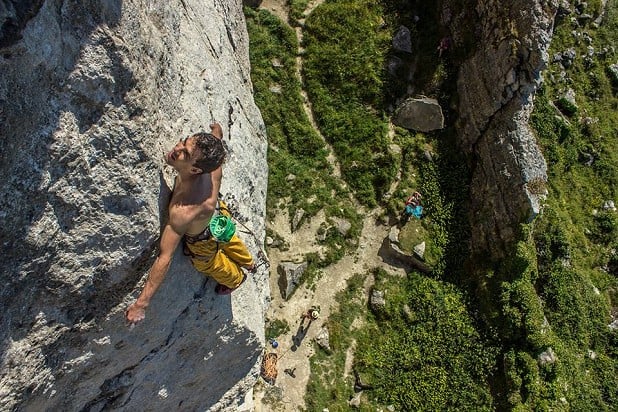
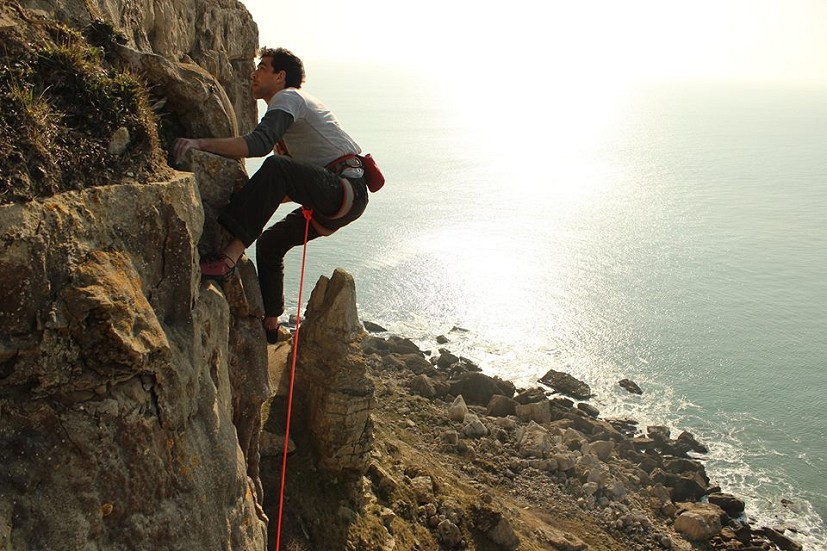
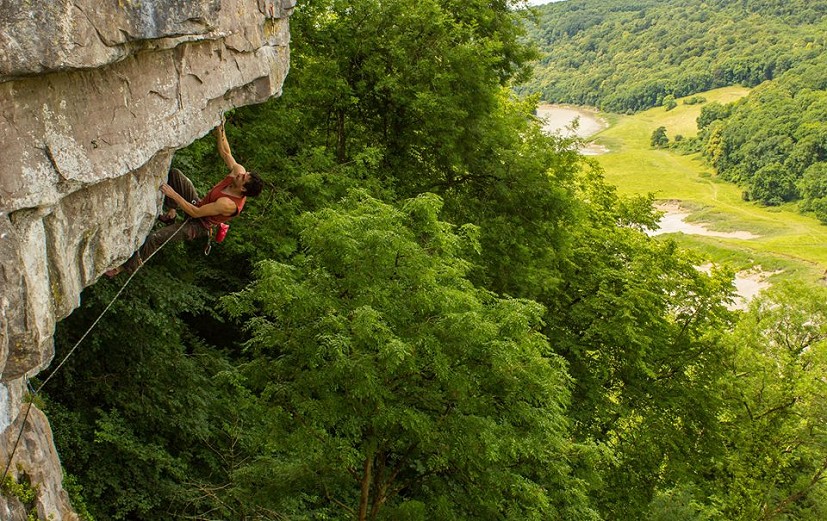



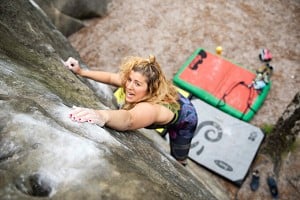
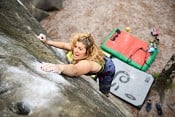








Comments
Awesome article Tom, a really interesting read!
The paragraph involving the man who farts in lifts made me happy. Ha!
While it doesn't necessarily invalidate anything Powell says, I'm immediately wary of anyone who claims to be a "Master Practitioner of Neuro Linguistic Programming", as if that isn't something I could order off the internet. NLP is pseudoscience and has been widely discredited.
'An example of this is the feeling of dread when your friends ask you how your day at the crag went,'
No, don't have this.
Does that get me off the rest of the NLP stuff?
Couldn’t take the rest of the article seriously because of the above.
"If I am standing in a lift filled with 10 people and I let out an audible and prolonged fart it would be socially normal for me to feel ashamed of myself because it is in our culture in the UK to be shamed for our bodily emissions (unlike in a group of hippos where I could spray my poo with my tail to impress female hippos)."
Perhaps the finest sentence I've ever read on UKC.